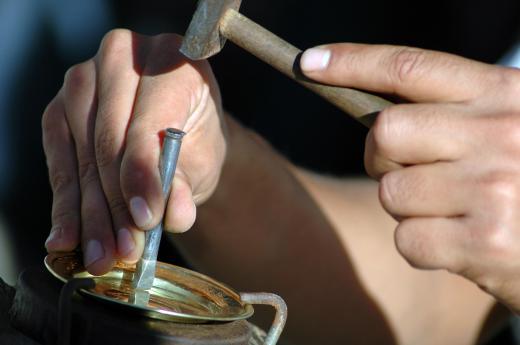Custom etching is a service in which etching is performed to a customer's specifications by commission. This type of service can be used for a wide variety of purposes, from laser etching identification numbers on computer equipment to make it easy to identify in the event of a theft to custom etching of wineglasses for a wedding so that guests have souvenirs. Many companies which offer etching services provide custom etching, at costs which vary, depending on the material being etched, the design, and how much etching is required.
Etching is a technique in which abrasive materials or chemicals are used to create a pattern in a flat plate. Historically, it was used to etch patterns into metal plates which were then inked and used to create prints known as etchings. This practice still continues in many regions of the world, but the word “etching” has come to refer to a wide variety of designs produced in metal, glass, wood, and plastic, using chemicals, lasers, or abrasive materials.

People can request custom etching for a wide variety of purposes. Using etching to embed identity numbers into things is a common practice; etching can be used to mark the windows in a car, furnishings, electronics, and a wide variety of other personal possessions. The advantage of etching is that it is impossible to remove without leaving a very obvious mark or replacing an etched component entirely, which makes etched possessions much less appealing to thieves. Etching services of this kind are sometimes offered for free by law enforcement or community agencies.
Custom etching may also be utilized to create custom works of art, commemorations, or decorative designs. For example, people might etch names and job titles into the glass doors of an office, create an etched plaque as an award, etch glasses for events, or use glass etching to create a decorative window. The artwork can range from simple to complex, depending on the skill of the etcher and the size of the project.
There are alternatives to custom etching, such as painting or applying decals, and some alternative methods look very similar to finished etched pieces. However, etching is indelible, and will endure until the object itself starts to break down, and some people prefer the very distinctive look of a true etched piece. Etched glass, for example, has an appearance which cannot be easily mimicked, although glass workers have certainly tried.
Ever since she began contributing to the site several years ago, Mary has embraced the exciting challenge of being a About Mechanics researcher and writer. Mary has a liberal arts degree from Goddard College and spends her free time reading, cooking, and exploring the great outdoors.

